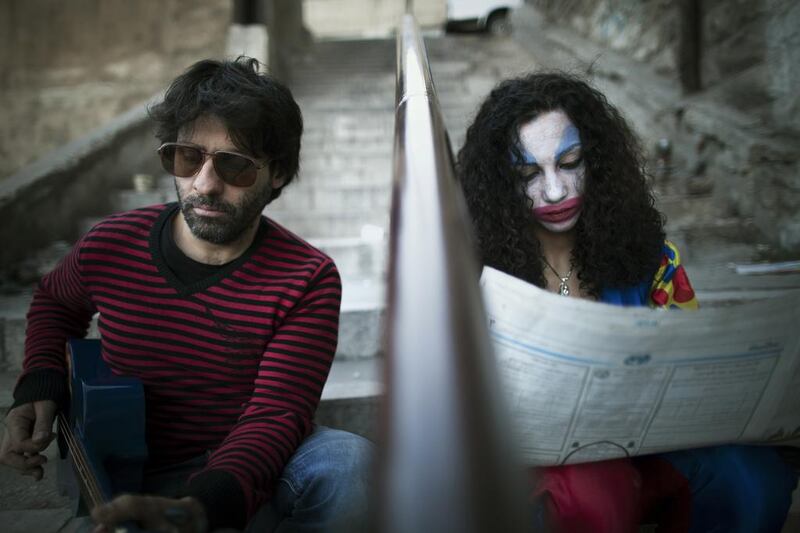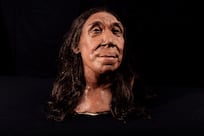Zeid Hamdan and Maryam Saleh are two of the most important figures in contemporary Middle Eastern alternative music.
Saleh, an Egyptian singer and composer, is often associated with the country’s underground music scene. This movement played a role in the 2011 to 2012 protests that resulted in Hosni Mubarak’s removal. However, her activities in the performing arts are much broader.
Lebanese producer Zeid Hamdan, meanwhile, has a long list of musical enterprises. The most legendary being Soap Kills, with singer Yasmine Hamdan. Their 2002 album Cheftak was a sort of Portishead meets the music of Lebanese singer Fairuz, but entirely in their own style. The album remains one of the most consistent achievements in Arabic music. See it as a Sgt Pepper's, or maybe an Abbey Road, as Soap Kills effectively broke up soon after.
The first time Hamdan and Saleh teamed up was in 2010, under the name ShiftZ (Zeid Hamdan) feat Maryam. The song, Esla7at, composed by Saleh, stood out because of its angst-laden atmosphere. The accompanying video was just as gripping, showing the singer restlessly roaming the streets of Alexandria. The mood of the song seemed like a prelude to the political turmoil that followed.
Now the duo have released their first album together, Halawella. It contains several covers of songs by Sheikh Imam, an acclaimed Egyptian political singer who died in 1995. Sheikh Iman is known for his satirical songs in favour of the poor and the working classes. He was a friend of Saleh's father, sang at her birthday parties when she was a child and now she is the main interpreter of his music.
Other songs in the album include words by various young Egyptian authors and the venerated poet Ahmed Fouad Negm, who died two years ago.
Throughout the album, Hamdan hits a harder note than he does with other collaborators. We hear colder technical sounds, in line with the sharp mood of the texts and Saleh’s frantic voice. Known for his love of vintage synthesisers and early drum machines, Hamdan applies harsher beats and sharper beeps than in other works.
The title Halawella means clown. Saleh once stated that in her early acting career, she was always supposed to play the clown. That, perhaps, explains the title. And although many of the songs originate from anger and indignation, the title also expresses the prevailing mood of the album, which is that messages are more effective when they are embedded in a certain layer of humour.
In the opening song Watan El Akk (watan means homeland, akk is something like mishmash), the text calls, half jokingly, for undeterred love for Egypt, despite the mess and the misery. It also pokes fun at people who hide a lack of sophistication and education by assuming religious and traditional values; at Gamal Mubarak (the son of former president Hosni Mubarak, who was once set to take over the country); and the supposedly cool, armchair socialists that some view as role models. Meanwhile Zeid invokes funny, hookey riffs from his plopping synths.
Walaa Soda (black cigarette lighter) is about Egypt being crowded, while its people are unable to shape their lives because of lack of opportunities. The contrast between the lyrics and the seemingly cheerful music is striking, the song having a cabaret-esque Bertolt Brecht-Kurt Weill Threepenny Opera-like mood.
The cover of Sheikh Imam's Valerie Giscar D Estaing is a take on another of his satires on trendy, upper-middle class socialists using French instead of Egyptian Arabic. The song, about the former French president's visit to Egypt in 1975, is highly critical of the pomp and splendour surrounding the event at a time when many Egyptians were extremely poor. It satirises the perceived false promises made at the time to improve the lives of ordinary Egyptians and the naivety of western politicians. As the song describes, Giscard d'Estaing represented a rather superficial version of foreign culture, with Egypt's bourgeois classes only copying outer appearances. The musical arrangement of the song demonstrates again how a basic melody line can be turned into an elaborate pop arrangement.
The resulting soundscapes are reminiscent of late 1970s electropop, such as M's Pop Muzik, but also 1980s New Wave music from the United Kingdom, such as early Human League. The simpler tones also correspond with the Sheikh Imam's musical approach, which mostly used a sole oud as accompaniment.
In the same way, Nixon Baba, from Sheikh Iman's original Sharaft ya Nixon baba (It's Been an Honour, Father Nixon), takes apart the American president Richard Nixon's visit to Cairo in 1974. Nixon was then embroiled in the Watergate scandal and the original lyrics claim he was trying to use the visit to boost his popularity. On this album, the version becomes a bright pop song with self-assured vocals and almost tropical-sounding instrumentals.
Other songs, such as Emchi Ala Rimchi (Walk on My Eyelashes, a humorous love song with music by Saleh) and Ghaba (Jungle), a metaphor for human society and another Sheikh Imam song), are turned into miniature electronic soundscapes, where Hamdan proves once more to be one of the most important soundsmiths of the Middle East.
Halawella is the result of two strong personalities who are artistically different, but who admire and like each other. It's clear that the album took several years to complete, but the ensuing controlled partnership is impressive.
This album is available on Amazon.
Neil van der Linden curates music events in the Middle East and North Africa, is editor of the online Gulf Art Guide and writes about Middle East music for Songlines.





